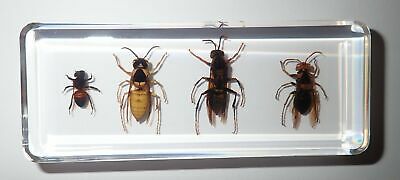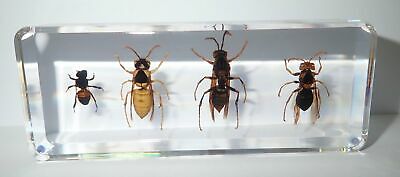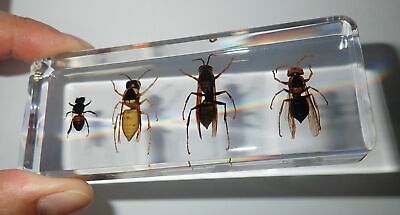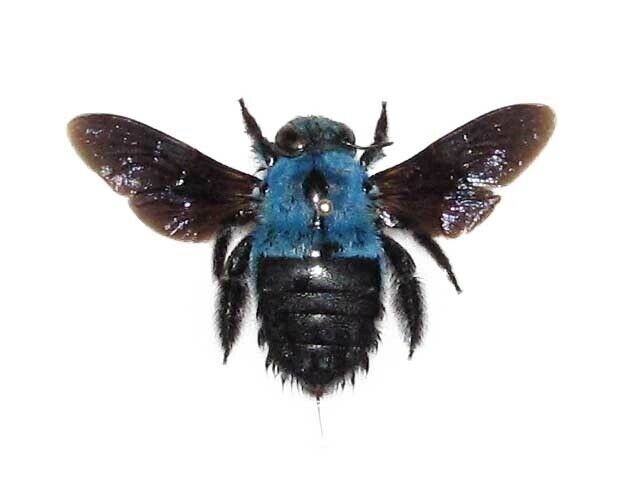-40%
Yellow Wasp & Honey Bee & Black Shield Wasp & Tiger Hornet Collection Set Clear
$ 9.49
- Description
- Size Guide
Description
Real Lesser Banded Tiger Hornet - Vespa affinis, Honey Bee-Apis mellifera, Yellow Paper-Wasp - Polistes olivaceus and Black Shield Wasp - Vespa bicolor specimen encased in clear lucite material. The specimens are crystal clear, indestructible and transparent. Safe, authentic and completely unbreakable product put real insect specimens right at your fingertips!Anyone can safely explore the specimens from every angle.
It is clear enough for microscope observation.
Size of the hornet is 2.8 cm (1.1 inch), size of the honey bee is 1.2 cm(0.5 inch), size of the yellow wasp is 2.0 cm (0.8 inch) and size of the black shield wasp is 2.0 cm (0.8 inch).
Allaboutlearning
Your best online business partner
Yellow Wasp & Honey Bee & Black Shield Wasp & Tiger Hornet Collection Set Clear
Real
Lesser Banded Tiger Hornet -
Vespa affinis,
Honey Bee-
Apis mellifera,
Yellow Paper-Wasp -
Polistes olivaceus and
Black Shield Wasp
- Vespa bicolor
specimen encased in clear lucite material. The specimens are crystal clear, indestructible and transparent. Safe, authentic and completely unbreakable product put real insect specimens right at your fingertips!
Anyone can safely explore the specimens from every angle.
It is clear enough for microscope observation.
Size of the hornet is 2.8 cm (1.1 inch), size of the honey bee is 1.2 cm(0.5 inch), size of the yellow wasp is 2.0 cm (0.8 inch)
and size of the black shield wasp is 2.0 cm (0.8 inch).
Size of the lucite block is 11x4.3x1.9 cm (4.3x1.8x0.8 inch).
Each one comes with a cardboard box for easy storage.
Weight of the block is 150 g and 180 g with packing box.
This is a handmade real animal specimen craft. Each one will be a bit different (specimen size, color and posture) even in the same production batch.
The pictures in the listing are just for reference as we are selling multiple pieces with same pictures.
It is an ideal learning aid for students and kids and also a very good collectible item for every body.
***
Lesser Banded Tiger Hornet -
Vespa affinis
This is a small to medium-sized hornet, with queens reaching 30mm, males 26mm and workers being an average of 22 to 25mm. There are several geographical forms or subspecies; the ones found in South China are generally mainly black, with the first two abdominal segments being a deep yellow, forming a conspicuous band. The sides of the head and thorax show some reddish brown. On the other hand, specimens from Southeast Asian regions such as Singapore are fully black, without reddish brown markings, and the abdominal band is a brilliant orange.
This species is widespread throughout Asia. It can frequently be seen foraging close to the ground in grassy areas, forest and wasteland. This species seems to prey heavily on flies which can be pests. It can frequently be found on the beach, staying near rotting mussels which smell bad and attract flies. Initially, I assumed they were taking the mussel meat to feed their larvae, but it turned out that they were simply creeping into the mussel shells and hiding there to ambush the flies! They also love the nectar from flowers of the coconut tree, and often, after drinking their fill, conveniently grab a honeybee from a nearby flower and head for home. Besides these, they will also attack any small insect they can overpower. They will also collect meat from freshly dead insects.
The nest of
Vespa affinis
is usually high in a tree, although on occasion they build lower. It is generally elongated, and looks similar to the nest of
Vespa velutina
. However, it can be distinguished by having a more imbricate nest envelope (many individual overlapping circular layers of papering, as opposed to running vertically lengthwise), and the nest has a tough, durable appearance. It can often reach 60 cm in length in sub-tropical areas, and even larger in true tropical regions. Also, there is an interesting variation of nest shapes; in tropical areas, the top of the nest is very narrow but tapers out downwards, forming a "pear-shaped" or "drop-shaped" structure. Nests in subtropical regions are simply oval with a rounded top. In South China, this species has an average life cycle; the queens awake from hibernation in April, and the colony usually dies only in late November. In fully tropical areas, it seems present all the time. This species is known for multiple queen founding or even swarm founding (known in scientific terms as pleometrosis) in tropical regions, where several queens or multiple queens with a swarm of workers from the old colony start a new nest together.
Yellow Paper-Wasp -
Polistes olivaceus
OMMON NAMES:
Yellow Paper-Wasp, Yellow Oriental Paper-Wasp, Redbrown Paper-Wasp; German Feldwespe
GLOBAL DISTRIBUTION:
NATIVE India - e.Asia;
EXOTIC
EXOTIC e.Africa - Marquesas, Easter Is.; Hawai‘i
SIGNIFICANCE LIST:
; Poisonous sting - serious
KEY FEATURES:
Large, 20mm TL. THORAX dorsal shield black with two long and wide longitudinal yellow stripes, expanded anteriorly, and yellow patches laterally; anteo-lateral plates yellow rimmed with dark centres; posterior plate orange-brown with posterior yellow bar; WAIST mainly yellow, with black lines; ABDOMEN anterior yellow, 2nd seg red yellow with fine black band, remainder yellow with black bands. WINGS yellow. LEGS yellow-brown (male - inner seg. with black).
Black Shield Wasp
- Vespa bicolor
Class: Insecta
Order: Hymenoptera
Suborder: Apocrita
Family: Vespidae
Subfamily: Vespinae
Genus:
Vespa
This is the smallest species of
Vespa
, and certainly one of the smallest in the world (perhaps the smallest). It is easily recognizable due to its bright yellow colour; it has a black triangular patch on the central part of the thorax, and the abdomen sometimes displays black stripes due to expansion when the wasp is eating. Queens are far larger than workers and reach 25mm or more; males average 19 to 23mm, and the largest workers reach 22mm. Most workers I find are in the range of 17 to 19mm, and some only 15mm.
Vespa bicolor
is one of the most common social wasps, along with species of
Parapolybia
. It can be found in a wide range of environments, and frequently appears near human dwellings.
Vespa bicolor
is not at all picky regarding its choice of prey. Workers of this species target small flying insects, and tend to hunt by site. They are also fond of human food, particularly meaty items, and frequently appear at barbecue sites. This is the only local hornet which seems to like collecting cooked meat. It can thus be a pest at barbecues and outdoor events. They apparently do not hurt people in their quest for food, and a small number can easily be chased away, but on occasions, when they appear in large numbers, it can be disastrous. They especially like the smell of barbequed meats and fish, as well as anything sweet. They also forage among garbage.
Vespa bicolor
is the smallest species of Vespa: Body length of workers only 15-22 mm, males 19-23 mm and queens reach 25mm.
Honey Bee -
Apis mellifera
The Western honey bee or European honey bee (Apis mellifera) is a species of honey bee. This species was introduced to China from early 20th century and has been raised widely around the country.
In the temperate zone, honey bees survive winter as a colony, and the queen begins egg laying in mid to late winter, to prepare for spring. This is most likely triggered by longer day length. She is the only fertile female, and deposits all the eggs from which the other bees are produced. Except a brief mating period when she may make several flights to mate with drones, or if she leaves in later life with a swarm to establish a new colony, the queen rarely leaves the hive after the larvae have become full grown bees. The queen deposits each egg in a cell prepared by the worker bees. The egg hatches into a small larva which is fed by nurse bees (worker bees who maintain the interior of the colony). After about a week, the larva is sealed up in its cell by the nurse bees and begins the pupal stage. After another week, it will emerge an adult bee.
For the first ten days of their lives, the female worker bees clean the hive and feed the larvae. After this, they begin building comb cells. On days 16 through 20, a worker receives nectar and pollen from older workers and stores it. After the 20th day, a worker leaves the hive and spends the remainder of its life as a forager. The population of a healthy hive in mid-summer can average between 40,000 and 80,000 bees.
Item Specifics
Country/Region of Manufacture
China
Material
Resin
Type
Collector Plate
Modified Item
No
Handmade
Yes
Animal Class
Bee
Payment
Payment: By Paypal
Shipping cost
Free shipping cost.
We send the goods to USA, Canada, UK, Australia, New Zealand, EU countries and some other European and Asian countries by E-express, a kind of fast postal service by Hong Kong Post. It usually takes about 6 to 10 working days for delivery.
We send the goods to other countries by registered airmail and will take about 8 to 14 working days for delivery.
Return policy
Returns: We accept returns with any reason in 30 days. Buyer will bear the return shipping cost.
Messages
We will answer messages in 24 hours during working days.
[ Policy
: This is the contents of your policies. You can add a banner for this policy as header and add text descriptions here. The text descriptions can be different Font Size, Font Color, Style and even graphics and icons are also accepted. ]
Allaboutlearning
Your best online business partner
Yellow Wasp & Honey Bee & Black Shield Wasp & Tiger Hornet Collection Set Clear
Real
Lesser Banded Tiger Hornet -
Vespa affinis,
Honey Bee-
Apis mellifera,
Yellow Paper-Wasp -
Polistes olivaceus and
Black Shield Wasp
- Vespa bicolor
specimen encased in clear lucite material. The specimens are crystal clear, indestructible and transparent. Safe, authentic and completely unbreakable product put real insect specimens right at your fingertips!
Anyone can safely explore the specimens from every angle.
It is clear enough for microscope observation.
Size of the hornet is 2.8 cm (1.1 inch), size of the honey bee is 1.2 cm(0.5 inch), size of the yellow wasp is 2.0 cm (0.8 inch)
and size of the black shield wasp is 2.0 cm (0.8 inch).
Size of the lucite block is 11x4.3x1.9 cm (4.3x1.8x0.8 inch).
Each one comes with a cardboard box for easy storage.
Weight of the block is 150 g and 180 g with packing box.
This is a handmade real animal specimen craft. Each one will be a bit different (specimen size, color and posture) even in the same production batch.
The pictures in the listing are just for reference as we are selling multiple pieces with same pictures.
It is an ideal learning aid for students and kids and also a very good collectible item for every body.
***
Lesser Banded Tiger Hornet -
Vespa affinis
This is a small to medium-sized hornet, with queens reaching 30mm, males 26mm and workers being an average of 22 to 25mm. There are several geographical forms or subspecies; the ones found in South China are generally mainly black, with the first two abdominal segments being a deep yellow, forming a conspicuous band. The sides of the head and thorax show some reddish brown. On the other hand, specimens from Southeast Asian regions such as Singapore are fully black, without reddish brown markings, and the abdominal band is a brilliant orange.
This species is widespread throughout Asia. It can frequently be seen foraging close to the ground in grassy areas, forest and wasteland. This species seems to prey heavily on flies which can be pests. It can frequently be found on the beach, staying near rotting mussels which smell bad and attract flies. Initially, I assumed they were taking the mussel meat to feed their larvae, but it turned out that they were simply creeping into the mussel shells and hiding there to ambush the flies! They also love the nectar from flowers of the coconut tree, and often, after drinking their fill, conveniently grab a honeybee from a nearby flower and head for home. Besides these, they will also attack any small insect they can overpower. They will also collect meat from freshly dead insects.
The nest of
Vespa affinis
is usually high in a tree, although on occasion they build lower. It is generally elongated, and looks similar to the nest of
Vespa velutina
. However, it can be distinguished by having a more imbricate nest envelope (many individual overlapping circular layers of papering, as opposed to running vertically lengthwise), and the nest has a tough, durable appearance. It can often reach 60 cm in length in sub-tropical areas, and even larger in true tropical regions. Also, there is an interesting variation of nest shapes; in tropical areas, the top of the nest is very narrow but tapers out downwards, forming a "pear-shaped" or "drop-shaped" structure. Nests in subtropical regions are simply oval with a rounded top. In South China, this species has an average life cycle; the queens awake from hibernation in April, and the colony usually dies only in late November. In fully tropical areas, it seems present all the time. This species is known for multiple queen founding or even swarm founding (known in scientific terms as pleometrosis) in tropical regions, where several queens or multiple queens with a swarm of workers from the old colony start a new nest together.
Yellow Paper-Wasp -
Polistes olivaceus
OMMON NAMES:
Yellow Paper-Wasp, Yellow Oriental Paper-Wasp, Redbrown Paper-Wasp; German Feldwespe
GLOBAL DISTRIBUTION:
NATIVE India - e.Asia;
EXOTIC
EXOTIC e.Africa - Marquesas, Easter Is.; Hawai‘i
SIGNIFICANCE LIST:
; Poisonous sting - serious
KEY FEATURES:
Large, 20mm TL. THORAX dorsal shield black with two long and wide longitudinal yellow stripes, expanded anteriorly, and yellow patches laterally; anteo-lateral plates yellow rimmed with dark centres; posterior plate orange-brown with posterior yellow bar; WAIST mainly yellow, with black lines; ABDOMEN anterior yellow, 2nd seg red yellow with fine black band, remainder yellow with black bands. WINGS yellow. LEGS yellow-brown (male - inner seg. with black).
Black Shield Wasp
- Vespa bicolor
Class: Insecta
Order: Hymenoptera
Suborder: Apocrita
Family: Vespidae
Subfamily: Vespinae
Genus:
Vespa
This is the smallest species of
Vespa
, and certainly one of the smallest in the world (perhaps the smallest). It is easily recognizable due to its bright yellow colour; it has a black triangular patch on the central part of the thorax, and the abdomen sometimes displays black stripes due to expansion when the wasp is eating. Queens are far larger than workers and reach 25mm or more; males average 19 to 23mm, and the largest workers reach 22mm. Most workers I find are in the range of 17 to 19mm, and some only 15mm.
Vespa bicolor
is one of the most common social wasps, along with species of
Parapolybia
. It can be found in a wide range of environments, and frequently appears near human dwellings.
Vespa bicolor
is not at all picky regarding its choice of prey. Workers of this species target small flying insects, and tend to hunt by site. They are also fond of human food, particularly meaty items, and frequently appear at barbecue sites. This is the only local hornet which seems to like collecting cooked meat. It can thus be a pest at barbecues and outdoor events. They apparently do not hurt people in their quest for food, and a small number can easily be chased away, but on occasions, when they appear in large numbers, it can be disastrous. They especially like the smell of barbequed meats and fish, as well as anything sweet. They also forage among garbage.
Vespa bicolor
is the smallest species of Vespa: Body length of workers only 15-22 mm, males 19-23 mm and queens reach 25mm.
Honey Bee -
Apis mellifera
The Western honey bee or European honey bee (Apis mellifera) is a species of honey bee. This species was introduced to China from early 20th century and has been raised widely around the country.
In the temperate zone, honey bees survive winter as a colony, and the queen begins egg laying in mid to late winter, to prepare for spring. This is most likely triggered by longer day length. She is the only fertile female, and deposits all the eggs from which the other bees are produced. Except a brief mating period when she may make several flights to mate with drones, or if she leaves in later life with a swarm to establish a new colony, the queen rarely leaves the hive after the larvae have become full grown bees. The queen deposits each egg in a cell prepared by the worker bees. The egg hatches into a small larva which is fed by nurse bees (worker bees who maintain the interior of the colony). After about a week, the larva is sealed up in its cell by the nurse bees and begins the pupal stage. After another week, it will emerge an adult bee.
For the first ten days of their lives, the female worker bees clean the hive and feed the larvae. After this, they begin building comb cells. On days 16 through 20, a worker receives nectar and pollen from older workers and stores it. After the 20th day, a worker leaves the hive and spends the remainder of its life as a forager. The population of a healthy hive in mid-summer can average between 40,000 and 80,000 bees.
Item Specifics
Country/Region of Manufacture :
China
Material :
Resin
Type :
Collector Plate
Modified Item :
No
Handmade :
Yes
Animal Class :
Bee
Payment
Payment: By Paypal
Shipping cost
Free shipping cost.
We send the goods to USA, Canada, UK, Australia, New Zealand, EU countries and some other European and Asian countries by E-express, a kind of fast postal service by Hong Kong Post. It usually takes about 6 to 10 working days for delivery.
We send the goods to other countries by registered airmail and will take about 8 to 14 working days for delivery.
Return policy
Returns: We accept returns with any reason in 30 days. Buyer will bear the return shipping cost.
Messages
We will answer messages in 24 hours during working days.
[ Policy
: This is the contents of your policies. You can add a banner for this policy as header and add text descriptions here. The text descriptions can be different Font Size, Font Color, Style and even graphics and icons are also accepted. ]
Copyright of XXXXX. All right reserved.
Shop Category
Store Home
Minerals, Stones & Gemstones
◈ Display Specimens Set
◈ Stone Mix & Bulk Lots
◈ Single piece
Animal and plant specimens
◈ Collection Sets
◈ Life Cycle Specimen
◈ Animal Skeleton
◈ Laminated Specimen
◈ Insect single specimen
◈ Animal single specimen
◈ Plant Single Specimen
Animal & plant ornament
◈ Key ring
◈ Bracelet
◈ Necklace
◈ Hanger
◈ Cabochon
◈ Magnet
◈ Dome paperweight
Meteorite & Tektite
◈ Black Tektite - Single piece
◈ Black Tektite - Loose Lot
◈ Black Tektite - Crafts
Star Ruby & Sapphire
▷ Star Ruby
♢ Opaque Star Ruby
◈ Star Sapphire
Turquoise items
◈ Natural - cabochon
Other
Hot Item
Insect Cabochon Black Scorpion Oval 18x25 mm on White bottom 2 pieces Lot
USD 12.00
Insect Cabochon Golden Scorpion Oval 18x25 mm on white bottom 2 pieces Lot
USD 12.00
Murder Hornet - 7 Seven Bee Wasp & Hornet Collection Set Education Specimen
USD 35.00
Insect Cabochon Golden Scorpion Oval 18x25 mm on black bottom 2 pieces Lot
USD 12.00
Murder Hornet Vespa Mandarinia Education Insect Specimen Clear Paperweight
USD 16.00
Picture
New List Item
Silver Wired Black Tektite Stone Pendant 6.3 gram 33x25x9 mm
USD 17.99
Turquoise Stone Flat Free Form Cabochon 203 Carat 3 pieces 40.6 gram- T
USD 29.99
Rare Very Large Black Indochinite Tektite Stone 122.7 gram 67x45x29 mm
USD 30.99
Turquoise Stone Flat Free Form Cabochon 182.5 Carat 4 pieces 36.5 gram Lot B
USD 27.99
Large Spodumene Kunzite Hiddenite Triphane Crystal 383 Carat 47x37x23 mm 76.6 g
USD 28.99
Custom Item

















